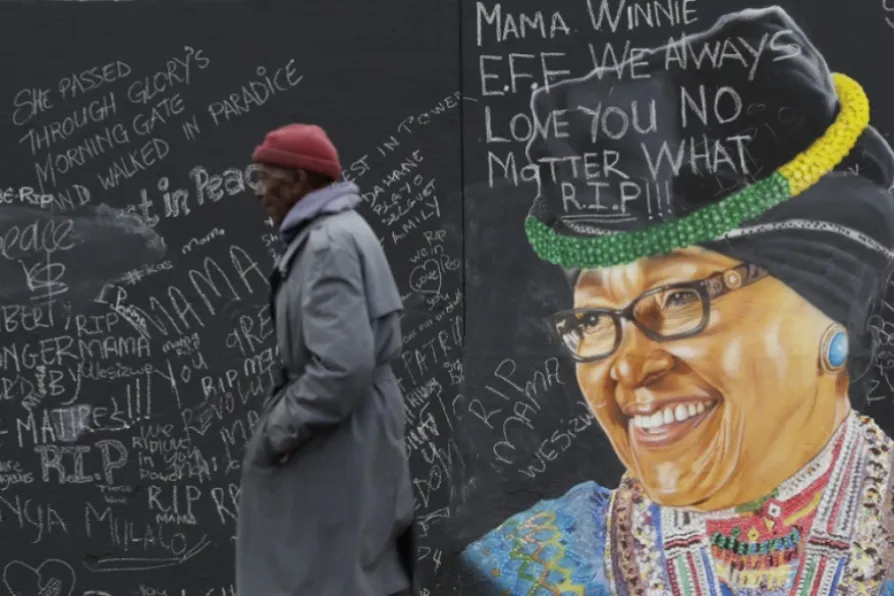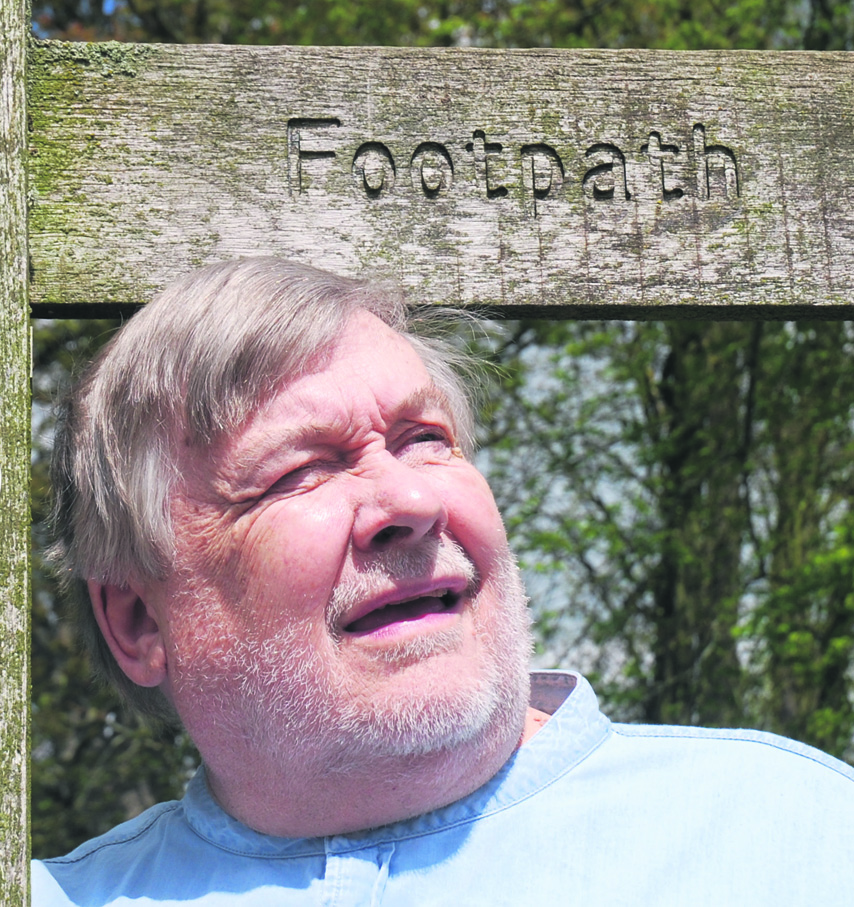Durham Miners’ Association general secretary ALAN MARDGHUM speaks to Ben Chacko ahead of Gala Day 2025

 A pedestrian passes a wall mural dedicated to anti-apartheid icon Winnie Madikizela-Mandela
A pedestrian passes a wall mural dedicated to anti-apartheid icon Winnie Madikizela-Mandela
WINNIE MADIKIZELA-MANDELA, one of the most potent symbols of the heroic struggle against the obscenity of apartheid in South Africa, has died at the age of 81.
[[{"fid":"3112","view_mode":"inlineright","fields":{"format":"inlineright","field_file_image_alt_text[und][0][value]":"Winnie Mandela","field_file_image_title_text[und][0][value]":false},"type":"media","field_deltas":{"1":{"format":"inlineright","field_file_image_alt_text[und][0][value]":"Winnie Mandela","field_file_image_title_text[und][0][value]":false}},"link_text":null,"attributes":{"alt":"Winnie Mandela","class":"media-element file-inlineright","data-delta":"1"}}]]The Tories and their tame media will want to concentrate of some of the failings she was accused of, but these were the people who half a century ago called for Mandela to be hanged and their racist demand was probably directed as much towards Winnie as to Nelson.
At various times she was accused of fraud, kidnapping and even murder. Most of the cases were thrown out.
In 1997, she appeared before the Truth and Reconciliation Commission. Chairman Archbishop Desmond Tutu paid tribute to her unique contribution to the anti-apartheid struggle but exhorted her to apologise and to admit her mistakes. Winnie humbly admitted “things went horribly wrong.”
I’ll let others concentrate on her failings as they certainly will. I’ll use my limited space to tell the story of a brave woman who played a unique part in what Nikolai Ostrovsky called “the finest cause in all the world — the fight for the liberation of mankind.”
Winnie was a 20-year-old social worker when she met Nelson Mandela. He was twice her age and already an acknowledged leader in the developing anti-apartheid struggle.
She too was soon just as deeply involved in the struggle working closely in the African National Congress (ANC) and with the South African Communist Party (SACP).
Her commitment both to the political struggle and her husband would lead to all kinds of persecution from the fascist, misogynist old white men who ruled South Africa. Remember these were men who had supported Hitler in the war.
They did all they could to silence the black rebels of the ANC and even more if those freedom fighters were female. Winnie was arrested, tried, jailed and banished to internal exile but no amount of savage and inhuman persecution could crush her spirit or silence her strident voice of protest.
For decades she and Nelson Mandela were the world’s most famous political couple. Even after their separation and divorce in 1996 she kept the name Mandela and they worked together in various aspects of the continuing struggle.
In later life her reputation took some knocks. She was accused of murder and fraud, both of which she denied. But she remained immensely popular with the people from whom she had sprung. They gave her the title Mother of the Nation.
While Nelson was in prison, Winnie took on an increasingly leading political role in demanding his release despite constant harassment by the security police.
She became an international symbol of resistance to apartheid and a rallying point for poor, black township residents demanding freedom.
Like Nelson she had periods of imprisonment from 1969, much of it in solitary confinement. In 1976, the year of the Soweto riots, she was banished from the township to a remote rural area. South African security forces burnt down her house and drove her into internal exile.
By the mid-1980s she was back in Soweto and at the heart of massive campaign of township militancy against the racist government.
Her marriage to Nelson broke down and they were divorced in 1996. They both worked together in the continuing struggle.
She served as an MP from 1994 until 2003 and then again from 2009 until her death. She was elected to the party’s top decision-making body, the national executive committee. During her many years working for the ANC she played a key role in developing and indeed leading its important Women’s League.
In 2013 the whole world mourned the death of Nelson Mandela and Winnie played a key part celebrating the life of a truly remarkable man.
Now we mourn the death of Winnie Mandela and pay tribute to a woman who gave all her life to the struggle to free the people of Southern Africa.
Another anti-apartheid hero remembered
THE death of Winnie Mandela had an added sadness as it occurred within days of South Africa and the entire world liberation movement marking the 25th anniversary of the death of Chris Hani, long-time leader of the South African Communist Party (SACP) and chief of staff of uMkhonto we Sizwe (MK) the armed wing of the African Nation Congress (ANC).
[[{"fid":"3114","view_mode":"inlineright","fields":{"format":"inlineright","field_file_image_alt_text[und][0][value]":false,"field_file_image_title_text[und][0][value]":false},"type":"media","field_deltas":{"1":{"format":"inlineright","field_file_image_alt_text[und][0][value]":false,"field_file_image_title_text[und][0][value]":false}},"attributes":{"class":"media-element file-inlineright","data-delta":"1"},"link_text":null}]]Chris and Winnie were both close friends and political allies. Indeed Hani’s daughter Lindiwe gave a touching tribute to both her father and Winnie at a 25th anniversary commemoration of Chris’s assassination.
“My father loved Mama Winnie, and she loved him as well.”
When the Hani family were able to return to South Africa from Lesotho, they stayed with Winnie and her family in Soweto.
Chris used Winnie as an example and an inspiration of what women including his daughters could do in the struggle.
Chris Hani was born Martin Thembisile Hani in 1942 in a small town in the Transkei. His father was an active member of the ANC and Chris tried to join at the age of 12. He finally joined the ANC Youth League when he was 15 years old.
At university he studied Latin, Greek and English literature and was active in protests against the Bantu Education Act. Following his graduation, he joined uMkhonto we Sizwe (MK) the armed wing of the ANC. After his arrest under the Suppression of Communism Act he was forced into hiding. At this time he changed his name to Chris.
He received military training in the Soviet Union and served in the liberation war in Zimbabwe, earning himself a reputation as a military strategist.
Having spent time as a clandestine organiser in South Africa in the mid-1970s, he returned permanently to South Africa following the unbanning of the ANC in 1990 and took over from Joe Slovo as head of the Communist Party.
He supported the suspension of the ANC armed struggle in favour of negotiations.
Chris Hani had survived at least three assassination attempts but on April 10 1993 he was shot in the head as he stepped out of his car.
The assassin was a Polish far-right anti-communist immigrant named Janusz Walus. Conservative MP and Minister Clive Derby-Lewis had planned the murder and supplied Walus with the pistol.
The pair were sentenced to death — commuted to life imprisonment when the death penalty was abolished.
Chris Hani was, like Winnie Mandela, second only to Nelson Mandela as a popular and respected character in the struggle against apartheid. We shall not see either of their like again.



















